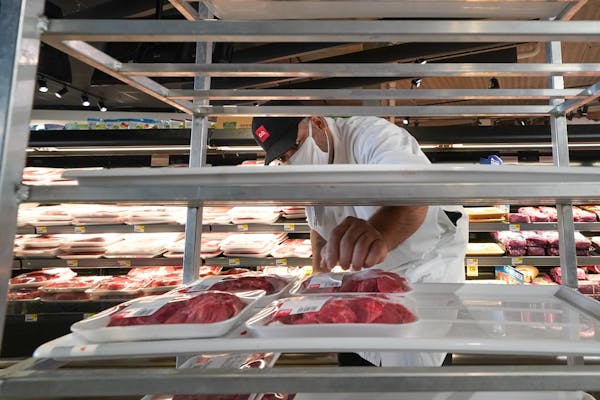With COVID-19 battering food supply chains, 10,000 hogs are being euthanized daily in Minnesota. Millions of healthy chickens also have been killed, and thousands of turkeys are likely to be next, the state's top agriculture official said Tuesday.
"It's about as big as an [agricultural] emergency as you can have, and on many fronts," said Thom Petersen, commissioner of the Minnesota Department of Agriculture.
The closures of several Midwest pork-processing plants have left Minnesota farmers — the nation's third-highest hog producers — with a lot of mature pigs and nowhere to put them.
Nearly 500 JBS workers in Worthington had tested positive for COVID-19 as of Monday, by far the largest workplace outbreak in Minnesota. More than 800 workers have tested positive for COVID-19 at Smithfield.
Smithfield Foods started reopening its Sioux Falls, S.D., plant Monday, and JBS in Worthington is scheduled to do the same Wednesday.
Both have reinforced worker-safety measures, state and union officials have said.
JBS "will be opening on a very limited capacity," Petersen said. "They are still at this point assessing workers who are able to come back to work [Wednesday]. Workers who are healthy are anxious to come back."
Normally, the plant employs around 2,000 on multiple shifts.
But Petersen said he expects there will be one shift with only a "couple of hundred" workers Wednesday.
The JBS plant last Wednesday started to euthanize hogs with a skeleton crew, with no meat processing. While JBS had hoped to kill 13,000 animals daily, it has only been able to do 3,000 per day, Petersen said.
Hog growers do not have to report how many healthy animals are being euthanized.
Petersen said based on reports from growers, that easily 10,000 hogs are being euthanized a day "and it could be much higher."
Dave Preisler, executive director of the Minnesota Pork Producers Association, said it's hard to know the exact number of hogs being put down.
"That's going to be a moving target, but is it significant? Yes. Is it going to be more significant? Yes," he said. Producers began euthanizing healthy hogs two weeks ago.
Over the past three weeks, "several million" healthy chickens also have been euthanized, though the situation has "stabilized a little" in recent days, Petersen said.
The culprit: a collapse of the fluid egg market sparked by the closure of so many institutional food providers like schools.
Demand for eggs in grocery stores has been high since the beginning of the pandemic.
But much of the egg-production system is built to provide fluid eggs to food-service companies, and retooling farms to provide eggs for retail is neither simple nor quick.
For example, a Cargill Inc. fluid-egg plant in Big Lake temporarily shut down in April and laid off 300 employees there — citing declining demand. The plant processes 800 million eggs annually, sending containers of fluid eggs to food-service companies across North America.
Due to COVID-19 cases among its workers, Jennie-O in the past 10 days has closed three Minnesota turkey-processing plants, two of which slaughter birds. No turkeys have been euthanized so far, but the pipeline is backing up.
"Tens of thousands of birds don't have a place to go," Petersen said. He said he expects some of those turkeys will be euthanized.
Minnesota is the nation's largest turkey-producing state, and Jennie-O — an arm of Austin-based Hormel Foods — is the industry leader. Hormel said in a statement Tuesday that "at this time, we hope to be able to continue to strategically manage our supply chain where [euthanization] won't be necessary."
The company said it has been managing the situation through "industry partnerships," and by diverting birds to its slaughterhouses in Faribault and Barron, Wis.
Mike Hughlett 612-673-7003 Adam Belz • 612-673-4405

Want to share info with the Star Tribune? How to do it securely

'Safe recovery sites' would offer syringes, naloxone and more to people using drugs. The plan could be in peril.
New Minnesota GOP leaders seek peace with party's anti-establishment wing

Who is Republican Lisa Demuth, Minnesota's first House speaker of color?

